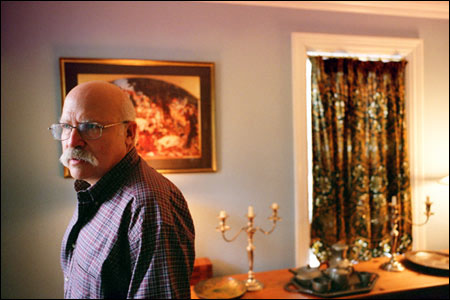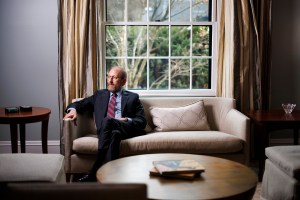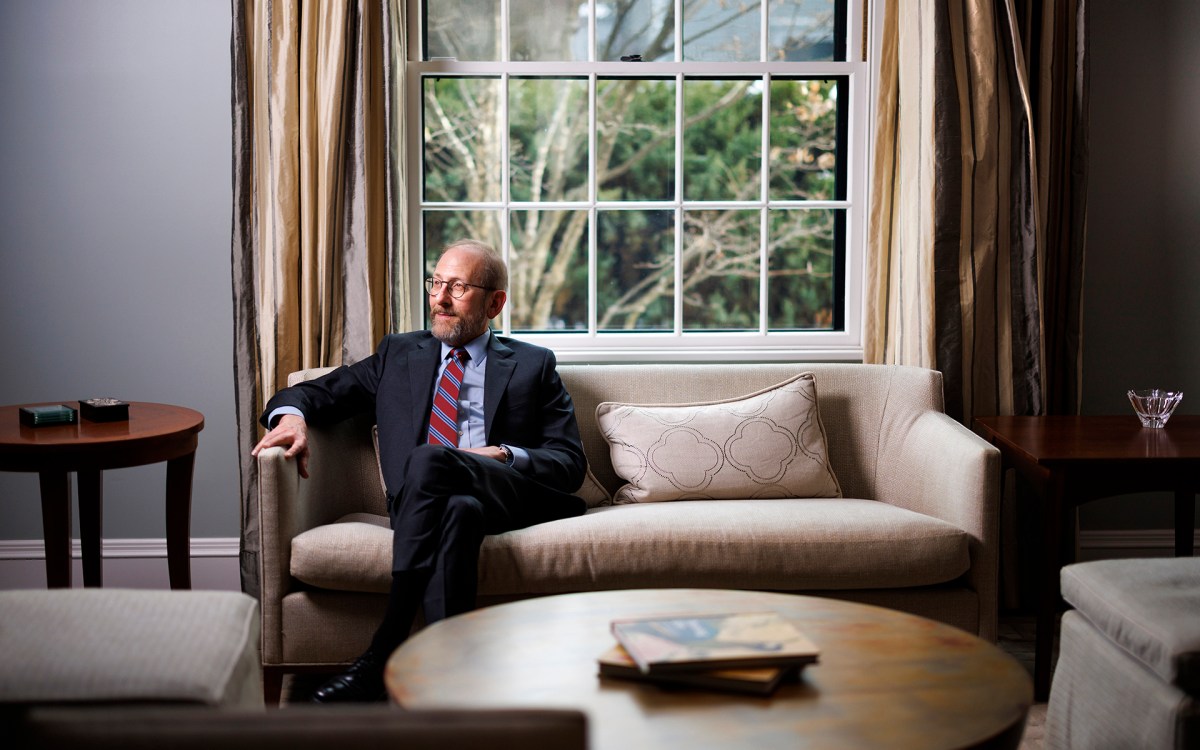The ‘controversial enterprise’
Shapin looks at the contemporary centrality and ‘unintelligibility’ of science

One of Steven Shapin’s current research projects is a study of the way science is conducted in the for-profit, high-tech sector. He is trying to understand how venture capitalists decide which research and which researchers to put their money on. He has discovered that the process is a surprisingly familiar one.
“Venture capitalists follow the adage, ‘Bet on the jockey, not on the horse.’ They’re looking for people who are dedicated, passionate, who have a high level of commitment. Knowing people counts for a lot. There’s a notion that in today’s world everything is governed by anonymous expertise. I question that. I think the world of techno-science is more like the premodern world.”
Shapin, recently hired as the Franklin L. Ford Professor of the History of Science, is well qualified to make that comparison. In his earlier work he established himself as one of the foremost authorities on science in 17th and 18th century Europe where philosophers and experimenters like Francis Bacon, René Descartes, Isaac Newton, and Robert Boyle laid the underpinnings of the modern scientific enterprise.
Taking an intellectual leap from the world of gentleman experimenters of the early modern period to that of high-tech entrepreneurs of the 21st century comes naturally to Shapin. His career has been marked by eclectic interests, a willingness to examine diverse subject matter with fresh eyes, and a commitment to making his findings available to a wide audience.
The Franklin L. Ford Professorship
Steven Shapin is the first holder of the Franklin L. Ford Professorship, named for the distinguished Harvard historian who served as dean of the Faculty of Arts and Sciences from 1962 to 1970 and who died in August 2003. The chair is the gift of Lisbet Rausing, Ph.D. ’93, and her husband Peter Baldwin, Ph.D. ’86, historians and philanthropists who also recently gave $5 million to support the Harvard University Library’s Open Collections Program. Baldwin studied with Ford when he was a graduate student at Harvard.
resulted in a number of scholarly studies, among them “A Social History of Truth: Civility and Science in Seventeenth-Century England” (1994) and “Leviathan and the Air-Pump: Hobbes, Boyle, and the Experimental Life” (1985). But it has also produced “The Scientific Revolution” (1996), a lucid and absorbing study of the attitudes and ideas that emerged in this period and that led, not only to important discoveries about the physical world, but to a new and challenging notion of what truth was. The book has been translated into 14 languages.
“I don’t think of this as popularization,” Shapin said, referring to this book and to the many articles and reviews he has written for publications such as the London Review of Books and the Times Literary Supplement. “I try to write as if I were talking to my most intelligent friend, who happens not to share my specialty.”
Shapin’s commitment to addressing a nonspecialist audience may be traceable to the fact that his own career path has followed a varied route and that not all the stops along the way have been academic ones. He started out wanting to be a scientist, earning a B.A. in biology from Reed College and doing postgraduate study in genetics at the University of Wisconsin, Madison. But somewhere along the way, he decided that the life of a scientist was not for him.
“I found that I loved thinking about science, but I didn’t much like washing out bottles or counting fruit flies.”
For a while Shapin tried his hand at science journalism and considered working in science policy in Washington, D.C. To further these plans, he enrolled in the Ph.D. program in the History and Sociology of Science at the University of Pennsylvania.
“After a while, the idea of going to Washington and having a nonacademic career disappeared,” he said.
As a historian of science, Shapin would like to have an impact on both scientists and nonscientists and believes his appointment at Harvard will put him in an ideal position to accomplish that goal. In a world in which science is becoming increasingly important, nonspecialists are being asked to make decisions about such highly technical issues as stem cell research and global warming, and through his teaching and writing, Shapin believes he can help prepare people for that challenge.
“Science has become more central as it has become more unintelligible. You’re never going to be able to teach students enough science to allow them to participate in debates at the most technical levels, but what you can do is introduce questions about the nature of science, to present science not as a complete system where the answers are all there, but as an enterprise that is essentially controversial at the advancing front of knowledge and where policy issues may be very much a part of the debate.”
Scientists can benefit from the historical and philosophical perspectives as well, Shapin believes.
“The majority of scientists are not interested in the history or the philosophy of science,” he said. “I’d like them to be. I subscribe to the Scottish tradition [Shapin spent 18 years teaching in the science studies unit of Edinburgh University], where you can’t call yourself an educated person unless you can reflect on the enterprise in which you are engaged.”




